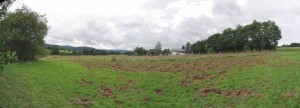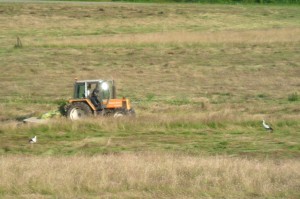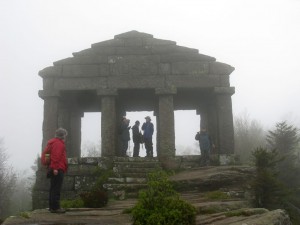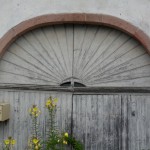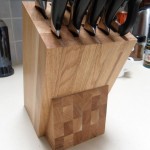To download a printable PDF version (no pictures) click on this link
E2E2013no2.pdf (seven A4 pages)
There are a couple of embedded links in the text
I should have known better than to go out into our field on a dull October Saturday to gather branches of pink spindle to cheer up the gloom. Suddenly there was a very loud bang. I turned and saw men with guns, dark against cloud-shrouded woods, closing in silently on the stream that separated us.
But, for the first year, the local huntsmen were not an unwelcome sight. The very night after the hunting season opened, in the quiet of the night, and completely unheard by us, a party of scavenging boars had turned over a long strip of grass between the orchard and the “arboretum”, and had returned to complete the job on a subsequent night.
Fond as I am of doing patchwork, it proved near-impossible to return the overturned clods to a reasonable position to make an even surface for the lawn mower (and its sea-sick driver) next year.
Earlier in the year we had heard an unfamiliar, harsh barking in the same field. No, not boars, though raucous enough for how one imagines them sounding, but deer. We watched, entranced, from the terrace as a baby deer was loudly encouraged by its mother, bound by bound, to make its way back from this unprotected field towards the shelter of the forest. What was it doing there? Had it got lost in the grass which had grown tall in all the rain and almost hid it from sight? Was its mother frantic with worry? It had to leap so high to follow its mother through the long grass to relative safety.
And, back in July, we’d seen an even rarer visitor. We’d spent the day in Strasbourg, where John had found a new (to us) restaurant in the picturesque Petite France area, close to the canals. We’d sat at a table outside on the narrow pedestrian street amid buckets of flowers and watched the world go by as we ate. My starter was a delicious fish terrine of North Sea fish and green vegetables with a lemon mousse sauce. The main courses were excellent too, so beautifully served, though the desserts seemed a bit ordinary in comparison.
We came back to find two tractors busy cutting the field below us and two storks foraging rapidly between the noisy machines, skipping and dipping their beaks for the uncovered lizards, crickets, voles and frogs. The very word “stork” sounds mediaeval and fairytale, and you think of their picturesque nests on turrets and steep roofs in Alsace villages. They used to be more common on this side of the Vosges (indeed, Rene Fonck, the First World War ace from the next village, used a stork as his emblem on his flying machine). Perhaps, while we were eating out in Alsace, these two had flown over to Lorraine for a day trip of gourmet harvest food. Will the young farmer be blessed next year with babies brought by the grateful storks?
Our next surprise – a resident, it would seem, rather than visitor – was less pretty. Back in autumn the men installing the photovoltaic panels had dumped the removed tiles there. In France the norm is to install photovoltaic panels directly onto the roof as a replacement for (rather than as well as) the existing covering – less weight?
Eventually we got round to selling the tiles to a man with a trailer. When John shifted a pallet on which a pile of roof tiles had been stacked, a very large toad, with a scaly grey face like a miniature dinosaur, sat motionless and staring in the hope that he wouldn’t be seen. So we don’t know when the toad had taken up residence or where he disappeared to when we weren’t looking.
Visitors here using the little back road, are used to their passage being blocked by Vozelle’s ducks, geese, guinea fowl and chickens, but rarely notice those of our neighbour Madame Laine, which were, more safely and discreetly, in a large, wire enclosure and wooden house behind her potato patch. The sad news is that, having stopped keeping a pig and other livestock, she has been killing off all her birds this autumn. As her legs have got more painful (and her husband’s heels have long been dodgy), the daily feed, especially in bad weather, has become more of a burden. So, end of birds and of the side-line in egg sales. Only the rabbits remain. A chair-seat has been installed on their back stairs. “It’s no fun, getting old”, she says morosely.
The monthly afternoon gatherings of the anciens of E2E continue with cake, champagne, cards and chatter. In May, to celebrate my 70th, John kindly baked a typical English, rich fruit cake for me to take to the gathering. I’d thought, long and hard, about whether to stick to what they were used to (éclairs would have been fine), or to introduce a bit of cross-culture. Alas, the organisers had to eat a slice each and insist it was really nice before any of the hardened traditionalists would risk it.
Much more festive was the gathering of our family and friends the following week. Sadly the weather was nothing like as good as it always is for John’s birthday at the end of October.
In mid-May we had rain, hail and snow. So no sipping champagne on the terrace. But, despite the weather and various coughs and colds, we managed a couple of good, though wet, walks, a couple of restaurants, a Colmar quiz and museums (out of the rain), and John’s back recovered sufficiently for all his cooking to go as planned. The star guest (for us, at least) was grandson Jacob who took delight in all the small wet rural pleasures like floating buttercups in puddles and running like mad for shelter. A typical memory of the gung-ho “make the best of it” spirit, was of the Italian café in the covered market in Nancy, where we took shelter from the lashing rain and cold, and created mayhem, while Toby and Stella walked through snow in the E2E hills! Guests were forced to accept a copy of Footprints, the novel I’d been writing over recent years, and fortunately managed to look more politely grateful than the villagers with their fruitcake. Its production was also the result of John’s labours, as he’d got it proof-read, printed and published, using an Amazon-related company, and although I’d always disapproved of vanity publishing, it was a thrill to see it in print for my birthday.
As you can imagine, despite the quantities of sausages in the freezer, we didn’t manage any barbecues that week. But shortly afterwards, the young couple at the chalet beyond us (the Munsch house) held a roofing party, with eleven or twelve friends up on the roof removing the old tiles, laying external insulated boarding and laying new tiles, and with protracted lunch-time and evening feasting down below in the garden. It all looked very bucolic. Maybe it was a bit too bucolic as the morning after the first overnight rain they returned to put plastic sheeting between the chimneys, which has remained there over the summer months.
The next barbecue involved the anciens of E2E trying out another new (to them) idea: the Sainte Marguerite farm museum’s annual lunch. We had been to the lunch a couple of years ago. This year’s invitation to the anciens presumably came about because the museum is run by two sisters, one of whom has become our mayor’s companion (now we know why he was running the bar there a couple of years ago). The E2E contingent were given two long trestle tables in the centre. Between courses, the main course being barbecued lamb, the other sister and some young people played old musical instruments (possibly from the museum collection), and a man told entertaining anecdotes whose punch-line John and I consistently failed to understand.
The most recent barbecue also involved the anciens, and also an odd experience. Our vivacious ex-fireman’s wife had offered to celebrate her September birthday with a barbecue lunch for the oldies to which everyone would take salads, and those who also had birthdays would take cakes. Of course, the weather that morning was 5°C with rain threatening, so everyone sat indoors in the community hall at beautifully decorated tables, while the ex-fireman and one of our neighbours set up the barbecue under the overhanging roof by the front door. It was very well done, with tasty starters followed by ample quantities of meat and colourful salads; but before the cake desserts, I was invited to join the group of three “walkers”. You won’t believe where we went. As we left the meal, one asked me lugubriously, “where will you go when you’re dead?” and looked shocked when I said I didn’t know. But it’s obviously important here, for we shuffled off to the cemetery, all of two minutes away, where I was introduced to the predecessors of everyone still in the village that I might or might not know. I heard who didn’t get on with whom, who drank themselves to death, who killed someone, who had a relative who came to the funeral in scarlet, who died last year, the children of whose mistress had placed an engraved tribute, who died young of leukaemia … until I pleaded that I was cold on the hill and we returned to very welcome desserts and warming coffee. I hadn’t realised what an endless source of gossip a churchyard could be, and we only did the top three rows!
But it’s not just been wet barbecues. We have, of course, continued to enjoy our restaurant excursions. One of these was the Sunday after my birthday celebrations, we drove across the Rhine to the small German village near Europa-Park where the former chef at the Blanche Neige now has a hotel and restaurant. As if we hadn’t eaten enough the week before, we indulged in his five course surprise menu, and then drove on to see the wonderful Chagall exhibition in a nearby village, in what was part of an old brewery, now all white walls and big spaces. We drove back via a third village, through pretty hills and vines and sunshine, to find the producer of the delicious Muskat that we had drunk with our lunch, only to find that it had closed a few minutes earlier. Heading home, the Rhine and the canal locks looked dangerously high, with water splashing up onto the bridge and tourists stopping to watch. Fortunately the Rhine level had dropped quite a bit when we returned a week later to buy the Muskat from Weingut Abril.
Another of our occupations, the vide-greniers, or flea markets have been a bit disappointing this year, partly because of poor weather, but also because most people have already sold off their interesting items in previous years. However, at nearby Saulcy, I was much taken with a large framed print of a Gauguin painting for only 1 euro. It now adorns the wall above the wine rack in the revamped second barn/ entrance lobby. And at Ban de Laveline we picked up some useful shelf brackets and a little brass tortoise (originally an ashtray) which is nosing its way along the garden path (without getting very far unless accidentally kicked). We didn’t spot much on the stalls at the Fraize flea market, but went up some front steps into a narrow house after John noticed, through the invitingly open door, the unusual blue and white tiled walls. It turned out to be an old butcher’s shop; the butcher’s grandchildren explained that the shop had been turned into a sitting room when the couple retired about twenty-five years ago, and now that grandmother had died and grandfather had moved in with them, they were selling the furniture and contents. So we bought some of their wine glasses as a small house-warming present for Toby and Stella. After all, not every English family drinks from a French butcher’s wine glasses.
You will gather from the above that Toby and Stella have, after all the delays, moved from their London basement. Months ago they put in an offer on a house they liked in Letchworth Garden City but contracts on that and their flat were not completed until August.
While I was enjoying a long-planned train-gang re-union in York, John helped them with the move and then (with brother-in-law Derek’s help) demolished much of a partition wall between their new kitchen and dining-room. The house is lovely and spacious and they are slowly decorating it to their taste. Jacob really relished the freedom of the new garden on the sunny days that followed. Toby then faced the delights of the daily commute to an office in Victoria (We took Jacob to the station with us in the car one evening to pick up Toby, who then failed to appear, having fallen asleep on the train. He did wake in time for the next station, but for a long time, whenever trains or stations were mentioned a little voice piped up, “Daddy asleep on train”).
Meanwhile, back in E2E, we had been forced into several considerably more expensive purchases than our flea market ones. When our small car, Snowy, aged 13, was taken into the garage because the brake pedal was suddenly very bad and he needed a service, it was discovered that all the underneath had rusted and corroded very badly (possibly after all the winter salt on the roads). As it would have cost well over £2,000 to repair, we started to think about a replacement. Snowy was named after Tintin’s little white dog, called Snowy in the English translation, as he was white and felt like a short-legged little dog scuttling along through fog and snow as I drove him back through France and Belgium to England after we collected him from the dealer in Epinal in December 1999. John was driving our bigger car just behind, shepherding Snowy along! It was very sad abandoning the faithful Snowy in the Toyota compound in Saint Dié. After some thought about whether we still need 2 cars, we chose a slightly larger Toyota Verso S from the showroom, which also happens to be white. We tried out various names for the new car including Milou (the original French name for Tintin’s little dog), but somehow none felt right, and we reverted to calling our small car Snowy.
Heating oil and boiler maintenance and repair are a regular expense. I wish I had a photo of John’s anxious face and twitching hands as he watched the lad who was sent out to repair our boiler when it refused to start after being turned off for an oil delivery back in July. The lad, who looked no older than a work experience third former (and hardly any older than the boiler itself), had clearly not encountered this model before, so John kept showing him the pages in the manual. Eventually, we tactfully suggested that perhaps his patron was more familiar with such an old model, and he withdrew, relieved. The patron, his arm in a sling, duly came with the lad the next day, but seemed no wiser. But eventually they ordered and installed to correct part. For some reason, we haven’t yet had the bill.
John has long been muttering about getting a new computer, and has finally done so. Transferring data and programs was always going to be a pain, but at least the timing was such that, having also immobilised his right leg with a hefty blow from his shovel while mixing cement, he had plenty to keep him occupied indoors. An X-ray showed nothing broken or chipped, just very bad bruising and he was prescribed crutches (a tasteful shade of blue, with reflectors for the dark nights). His leg is meanwhile recovering slowly, and after four weeks he can again put on real shoes, rather than slippers or crocs, – and tie the laces.
Another large (in size, this time) purchase has been of wood. The Vosges area is littered with wood yards and the sound of sawing. But most of the timber is pine or similar. John has been planning on replacing our old barn doors (the ones that are large enough to allow a fully-loaded haywain to enter).
A charming, typical regional barn door style is the “sunburst” in which the panels in the upper semi-circle radiate out from the centre. We haven’t seen any replacement doors made in the old style, so this has been a challenge. One of the local wood yards had larch which John had seen recommended on the internet for garage doors. But the larch was only exterior cladding quality and not ideal for carpentry. The alternative was to work in oak. After many calculations and detailed consultations on possible designs with John S (including during the birthday celebrations), he put in an order for oak at the Lusse village wood yard at the end of July. Of course, you never expect anything to happen in August in France, but we were surprised to hear nothing throughout September. While his cheque remaining un-cashed, we began to wonder if the enterprise had gone bust or burned to the ground (or both). So, after a walk above Lusse, I wandered into the wood yard, where a man and a woman were loading some wood into the back of their van and I finally found a man on a tractor. Ah, still in business!
And, following my visit, John has finally heard that some of the wood they’d cut had not been of satisfactory quality but that the new wood should be available next Monday.By now it is, of course, getting too cold to work in the atelier where all his machinery is. His previous wood project had been a knife block for his Sabatier knives. So this is on a somewhat larger scale.
The walk above Lusse village was with the Sainte Marguerite group. As it was a lovely sunny day and also the start of the mushrooming season, there was a large turn-out. We parked just by the mouth of the long tolled road (originally rail) tunnel under the hill to Sainte-Marie-aux-Mines. I had hoped we might be going up to the chaume, the grazing pastures on the ridge, where we’d first seen the traces of the lordonbahn, the German supply railway in the First World War. But in fact we took a lower route. But I was pleased when we passed the countess’s château I’d been reading about (which the Germans occupied) and could now visualise some of the outlying hamlets mentioned in a village woman’s journal of the 14-18 war. The further we walked, the more and more strung-out the group became as people lingered to pick fungi – they each seemed to have their favourite species for cooking and swapped quite amicably. At one point the path had become obscured by brambles since the leader had last walked it two years ago and I thought we’d lost several stragglers (the leader didn’t seem to do much counting of his herd). However, when the front reached a hamlet and paused to chat to inhabitants, the rear of the group with their bulging bags slowly trickled down and it was pronounced a good walk!
Being ignorant of the good and the bad in the fungal world, we have not been experimenting. But our shelves in the barn have been restocked with rhubarb and ginger jam and a spicy plum jam reminiscent of mulled wine. More plums are in the freezer till we acquire more jars; so only one batch of plum chutney so far. This year the autumn raspberries, blueberries, green beans, peas, courgettes, beetroot, carrots, onions, leeks, chard and squash have all been good, despite a late start. But the blackberries, blackcurrants and walnuts have been almost non-existent and the broccoli have bolted. A strange year.
And perhaps we should conclude with a bit of Culture, as there hasn’t been much so far. Saint Dié, as you are constantly reminded, is the capital (self-appointed) of World Geography. At the beginning of October street signs and shop signs there started to appear on banners of beautiful calligraphy; for the guest of honour was to be China. There were plenty of worthy lectures on economic geography which we could have attended, but of greater appeal were the talks on contemporary Chinese novels, and on problems of literary translation. And which characters peopled the last lecture I attended? Tintin and Snowy, of course, in a very entertaining discussion of the Chinese calligraphy, political allusions and background architecture in the Blue Lotus.
And finally, if you are feeling cheerful and devoid of guilt at this point, I should say, “Fashoda!” with a knowing sneer. We have grown accustomed to being made to feel guilty, on behalf of the perfidious English, for the burning of Joan of Arc and the theft of the Rosetta Stone. But Fashoda? It was at a lecture on France, China and the Boxer rebellion that the F word was mentioned and dirty looks cast, and we acquired another burden to bear.
So, F … arewell and Au revoir!

